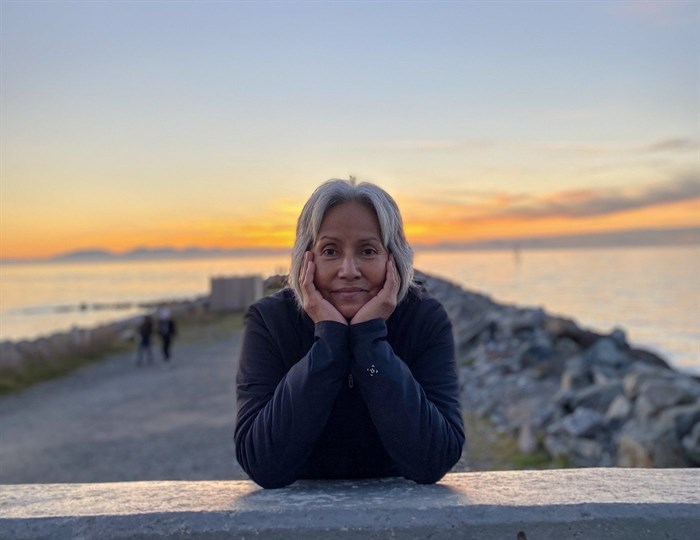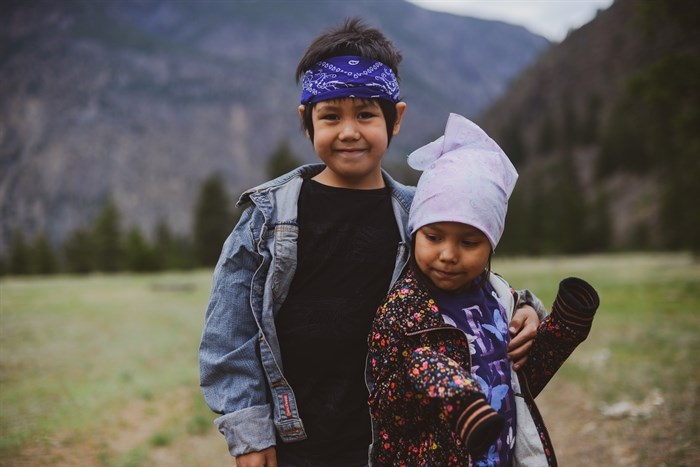
Marlene Squakin, syilx woman, and knowledge holder has been carrying the stories shared by her relations.
Image Credit: SUBMITTED/Marlene Squakin
July 12, 2021 - 7:00 PM
nsyilxcen language speaker Marlene Squakin, who also goes by yaxma (cedar basket), says according to syilx prophecy, “truth will be revealed,” and it’s the youth who will lead the way.
Yaxma, whose mother attended a residential “school,” calls recent confirmation of graves “irrefutable evidence” that’s working to “awaken the world to the genocide of Indigenous Peoples.”
“Our mother tongue speakers (fluent speakers) are able to witness the resolution of generations of injustice and intergenerational trauma inflicted upon our families,” yaxma said. “Despite having endured legislated genocide, our Elders set their hearts on the swiwinumta (handsome, beautiful ones — youth), who provide hope for a better future.
“Our youth are our most valuable resources of our nations,” she says, and they’re inheriting this time when the truth can no longer remain hidden.
There are many misconceptions about names, origin stories, cultural nuances, within the syilx territory. yaxma speaks about how the word Okanagan came to be, as an example.
Basic searches on the official websites of the city of Vernon, Kelowna, and even the Canadian Encylopedia share stories of what may be considered settler folklore.
Vernon’s tourism website says the word was derived from a “legend” of nxaxaitkw, who they refer to as “Ogopogo.” The site says that “Ogopogo” was a “demon possessed man” who murdered a man named, “‘Old Kan-He-Kan,’” and that “Okanagan, was chosen as a remembrance to the man.”
The site goes on to say, “The Indian Gods punished the murderer by forcing him to live forever at the scene of his crime by turning him into the lake serpent.”
Travelling 30 minutes to the south in Kelowna, there isn’t much to be said on the city’s website except, “It is a nsyilxcen (en-seal-x-en) word that is used by the local first people to identify the area and themselves.”
The Canadian Encyclopedia states that the valley translates to mean “place of water,” while the S.S. Sicamous website says Okanagan means “rendezvous.”
yaxma says these misconceptions are quite far from syilx stories.
sukanaqin
yamxa says that it’s traditional protocol for a syilx person to speak to what they are, not who they are.
During an interview, she gets up to grab a piece of paper to write out nsyilxcen words, while sharing oral stories.
Some stories can’t and shouldn’t be shared, because they belong to the syilx people and hold sacred law, she explains.
“It’s part of our protocol, or the way things are done,” she says. “It’s kind of rude to directly ask [for someone’s name], that’s how it’s been explained to me.”
When the settlers asked the syilx individuals they first came across who they were, they replied that they were, “sukanaqin, (Soo-Kan-aw-kane)” sharing what they were.
“Something similar to an occupation,” says yaxma.
“They were runners, long distance runners that carried messages from the valley bottoms to the mountain tops,” she explains.
The colonial settlers then revised the name to appease their European tongues and the name became - Okanagan. yaxma has heard other explanations as well, she says.
“One of the other explanations I’ve heard is the top of txitqn (t-hee-t-can), the head, or the top, of the tallest mountain,” she continues.
If you go to the top of the tallest mountain and you look all around, that’s all Okanagan territory.”
When people first arrived to syilx territory, and asked how far the territory stretched, runners told them they could run “ten days in either direction,” yaxma says. “So that was our traditional territory.”
Words in the nsyilxcen language are connected to stories, stories embedded in the Okanagan lands, yaxma says.
The word sukanaqin is broken down to share a deeper meaning.
“‘sux’ ‘suxw’, means ‘ones who,’ and ‘naqs [is] one’,” she says. “‘qin’ [is] top, or head.”
They were the ones who carry messages for the people.”
Two other meanings just vary the location of where you are looking out on the land, so as far as you can see is Okanagan territory, she explains.
One mountain (highest mountain) is txitqin (t-hee-t-can)”
The, “‘t’ can refer to a location,” and the “xit (heet), is the top, or the best, or when you discipline yourself to be the best you can be,” she shares this through writing while explaining it orally.
“qin – top or head (cane),” she says.

kilawna and palwícya? claim their birth right to gather spitlem on the land in yaxma’s homeplace, smelkmixw (Similkameen).
Image Credit: Kelsie Kilawna
Reclaiming the truth
Reclaiming the truth is part of the greater work going on right now in these times of unfolding prophecies, says yaxma.
She says it’s time for us to uplift our young people in knowing their truth, pouring back in what was historically taken.
“Youth provide hope for our future,” she says.
When a baby is born, our aboriginal rights and title is born, and reborn with each new generation. Each song, each ceremony, each Syilx word is evidence of our resilience to carry on as sqilxw people.”
Support for survivors and their families is available. Call the Indian Residential School Survivors Society at 1-800-721-0066, 1-866-925-4419 for the 24-7 crisis line. The KUU-US Crisis Line Society also offers 24-7 support at 250-723-4050 for adults, 250-723-2040 for youth, or toll-free at 1-800-588-8717.
Editor’s note: According to nsyilxc?n language keepers, there are no capitalizations in the spellings of any nsyilxc?n words. In an egalitarian society, capitalization insinuates there is something that holds more importance over another, and that does not fall in line with syilx ethics.
— This story was originally published by The Discourse and IndigiNews.
News from © iNFOnews, 2021